The annual Euro-Asia Economic Forum brings Shanghai Cooperation (SCO) states and Belt and Road (BRI) members together.




An Unconventional Reading of China’s Foreign Economic Policy: A Phase of Fluidity and Transformation
Dr. Digby James Wren
This article applies Marxist analytical tools to analyse the competing debates about the BRI’s historic origins, deployment, and integration. The article contends that Marxist notions of subnational regions and spatial fixes have the potential to inform analysis of the BRI’s transnational connectivity extensions and present it in different terms than is usually allowed in conventional readings of China’s foreign economic policy. Adopting such a perspective is particularly apposite given that China’s government has subscribed to such a worldview since assuming power in 1949. Marxist approaches to international relations, political economy, and geoeconomics deepened with Gramscian approaches to political and cultural hegemonic discourse and practice. Analysis of the historical determinants and contemporary trajectory of BRI deployment considered Giovanni Arrighi’s works and his use of Braudel’s la long dureé to contextualise the analysis.
Keywords: Multipolarity, multilateralism, Belt and Road Initiative, global economy, Three Worlds Theory
Read more here - Dr. Digby James Wren - An Unconventional Reading of China’s Foreign Economic Policy: A Phase of Fluidity and Transformation



